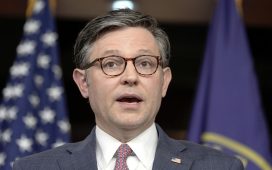PROGRAMMING NOTE: POLITICO Pro’s Morning Transportation will not publish on Thursday, Nov. 28, and Friday, Nov. 29. We’ll be back on our normal schedule on Monday, Dec. 2.
Editor’s Note: This edition of Morning Transportation is published weekdays at 10 a.m. POLITICO Pro Transportation subscribers hold exclusive early access to the newsletter each morning at 6 a.m. Learn more about POLITICO Pro’s comprehensive policy intelligence coverage, policy tools and services, at politicopro.com.
Story Continued Below
— With 13 months until a final deadline for railroads in the U.S. to have positive train control technology installed, freights are fine but commuter railroads have work to do.
— DOT is looking for ideas about how to utilize its new council on emerging transportation technology.
— A hypothetical regulation on rear seatbelt alerts that’s been years in the making is an example of the “snail’s pace” of regulation at NHTSA, a Washington Post report says.
IT’S TUESDAY: Thanks for tuning in to POLITICO’s Morning Transportation, your daily tipsheet on all things trains, planes, automobiles and ports. Get in touch with tips, feedback or song lyric suggestions at smintz@politico.com or @samjmintz.
LISTEN HERE: Follow MT’s playlist on Spotify. What better way to start your day than with songs (picked by us and readers) about roads, rails, rivers and runways.
A YEAR AND A BIT LEFT FOR PTC DEADLINE: Railroads are making progress on meeting a statutory mandate to install positive train control, but some hurdles still remain ahead of a rapidly approaching December 2020 deadline. The Federal Railroad Administration released data through Oct. 31 on Monday, showing that in total, PTC systems are governing operations on 92.4 percent of the required route miles.
Freight railroads are especially close to completing the mandate, with more than 95 percent of route miles complete. Canadian National Railway said Monday that PTC is operational on all 35 of its subdivisions in the U.S. where the technology is required. “This milestone is a testament to the tenacious dedication of our CN railroading family,” said CN’s Rob Reilly in a statement. “It has been a tremendous journey, full of challenges, and obstacles we overcame.” The railroad says that it’s currently interoperable with six other railroads and will complete that list by the December 2020 deadline.
But commuter railroads continue to lag behind, with PTC systems operating in revenue service on less than half of the 3,129 required route miles. The American Public Transportation Association said Monday that through the third quarter of 2019, 37 percent of commuter railroads are operating with PTC or have been certified by the FRA. 50 percent are in revenue service demonstration (an advanced level of field testing), 10 percent are in field testing, and 3 percent are still preparing for field testing. “The commuter rail industry is strongly focused and committed to completing full implementation by December 2020,” said APTA CEO Paul Skoutelas.
NOTHING BUT NETT: DOT wants ideas about how to use its newly created Non-Traditional and Emerging Transportation Technology, or NETT, council. So far, the panel has focused largely on hyperloop projects, but DOT said in a notice Monday that it wants the public to weigh in on “projects, issues, or topics that DOT should consider through the NETT Council, including regulatory models and other alternative approaches for non-traditional and emerging transportation technologies.” One caveat: don’t ask them to work on autonomous vehicles or drones, the notice says, presumably because even though those are emerging technologies, the agency is already putting plenty of resources into them through other means.
THE ‘SNAIL’S PACE’ OF AUTO SAFETY REGULATION: In a story published Sunday evening, the Washington Post took a look at the “snail’s pace” at which NHTSA develops new car safety rules, and how it’s crashing up against a technological revolution on the roads. The story’s main example is rear seat belt rules; safety advocates have been calling for more than a decade for mandatory warning systems alerting back seat passengers to fasten their seatbelts. Congress asked for a rule within three years in 2012 legislation. And NHTSA finally announced this fall, as Ian Duncan writes, that “they would think about it.” Or in other words, launch an advanced notice of proposed rulemaking to take public comment.
Key line: “The warning system’s odyssey through the federal bureaucracy highlights the snail’s pace at which consumer groups, the auto industry and former government engineers say new car safety rules travel,” the story reads.
With lawmakers working on long-stalled legislation governing self-driving cars, which itself would already be too late to dictate how those cars take to the road with no drivers, the extent to which NHTSA will be able to have an impact on the safety of autonomous vehicles is a question mark.
The agency told POLITICO: “Regarding the ANPRM, after extensive research, review, and evaluation, NHTSA is seeking comment on topics related to the potential requirement for a seat belt warning system for rear occupants. The average timeline for finalizing a rulemaking, from the initiation of research to the finalization of a requirement, may take years.” The NHTSA spokesperson said an ANPRM is “the best approach when we believe public input would help the agency to craft a proposal more effectively.”
APPROPS UPDATE: Congress may be on a break for Thanksgiving, but POLITICO’s analysis never stops. Tucker Doherty of the Pro Datapoint team has a new edition of his appropriations tracker up, looking at where things stand after a continuing resolution was signed into law last week. “Congressional appropriators now have another month to negotiate a compromise spending package — setting up the possibility of a final confrontation on the House and Senate floors just days before Christmas, under the threat of a government shutdown,” Tucker writes. Check out the full post here for a visual look at the rest of the congressional calendar and the status of the 12 spending bills.
SAFETY AGENCY FINDS METRO ISSUES: The Washington Metrorail Safety Commission, the safety agency with oversight over Washington, D.C., Maryland and Virginia’s Metrorail system, gave findings on three different safety issues to Metro’s leadership Monday. The categories: station overruns, unauthorized movement of trains after losing speed commands, and the use of personal electronic devices by operators. The latter two were connected to the October crash of two Metro trains, which is still under investigation by the safety agency. WMSC CEO David Mayer told reporters that the use of an electronic device may have played a role in distracting the driver of the striking train. Overall, he said, “Metrorail must do more to reduce unauthorized use of personal electronic devices.”
What’s next: Metro is expected to propose corrective action plans for the three problem areas, Mayer said.
The International Civil Aviation Organization has elected Salvatore Sciacchitano of Italy as its president for a three year term starting Jan. 1.
TWEET DU JOUR: An unlikely back and forth between Elon Musk and Neil deGrasse Tyson.
A badass @Tesla looking like it’s doing a badass thing. But if the @Ford F-150 is RWD **with no payload** then weight on the Rear Axle is greatly reduced, offering only mild traction for the Tesla to overcome. This contest is more about the Physics of Friction than Engine Power.
— Neil deGrasse Tyson (@neiltyson) November 25, 2019
— “Uber loses London operating license over ‘pattern of failure’” POLITICO Europe.
— “The California DMV is making $50M a year selling drivers’ personal information.” Vice.
— “DHL to debut zero-emission electric delivery vans in U.S. cities.” Reuters.
— “Turo, the ‘Airbnb for cars’, angers rental car companies.” Wall Street Journal.
— “Commuter misery after most ferries to N.Y. pulled over safety issues.” New York Times.
DOT appropriations run out in 24 day. The FAA reauthorization expires in 1,405 days. Highway and transit policy is up for renewal in 310 days.









